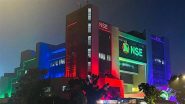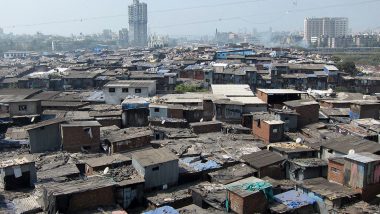Mumbai, March 20: Dharavi, the biggest slum in Mumbai, has reported 272 coronavirus cases so far in the month of March as against the entire February's infection count of 168, a rise of 62 per cent, civic officials said on Saturday.
The spike in cases in this slum sprawl, which is spread over 2.5 sq km of area, has set alarm bells ringing for the authorities, although they say that they are better prepared this year to tackle the situation as compared to last year when the outbreak had started. Mumbai: Dharavi Reports Zero New COVID-19 Cases Today; First Time Since April 1.
The officials said that the number of single-day cases in Dharavi, which had started steadily going up since February, has witnessed a significant jump starting this month. Till March 19, it has reported 272 cases.
The officials said that the cases being reported now are scattered across the slum and not concentrated in any particular pocket. Dharavi currently has 72 active COVID-19 cases. Of the total number of 4,133 patients so far, 3,745 have recovered, while 316 have died due to the infection.
Around 6.5 lakh people live in Dharavi, with a population density of 2,27,136 per sq km. Maintaining social distancing there is a tough task, as families of eight to 10 members live in 10x10 hutments and residents have to walk along narrow lanes lined with crowded tenements on either side.
This slum is also home to several small-scale leather, pottery and textile manufacturing units. The first COVID-19 patient in Dharavi was found on April 1 last year, about 20 days after the city reported its first case. Thereafter, the daily case count in Dharavi kept rising and it was declared as COVID-19 hotspot.
In the first week of May last year, it had reported 94 cases in a single day, its highest daily count. However, the number started going down gradually from the following month.
According to Brihanmumbai Municipal Corporation (BMC) officials, the daily number of cases from Dharavi went down significantly from November and it even did not report any case a few days in January and February.
In the last four months, the slum hardly reported any double-digit daily growth in cases. The highest single-day count during this entire period came on on February 16, when it recorded 16 new cases.
A number of steps, including proactive screening with the assistance of private doctors and community support, the authorities had managed to flatten the curve of viral spread. Even the World Health Organisation (WHO) took cognisance of the efforts and praised the "Dharavi pattern".
Kiran Dighavkar, assistant municipal commissioner of BMC's G-North ward that houses Dharavi, said that the number of COVID-19 cases in this slum are rising due to "pro-active testing and screening", but the situation is quite different from last year and fully under control.
"Last year, when there was an outbreak of COVID-19 in Dharavi, there werelimitations on testing and reports were getting delayed. Now, there are no such constraints as ample number of testing kits are available and we could do on-the- spot testing of all the traced contracts of a positive patient," he said.
He said that besides focusing on early contact-tracing and screening of people in Dharavi, they are also focusing on speedy vaccination of vulnerable people, like senior citizens and the people with co-morbidities, to keep the number of fatalities under control.
"Though the cases are rising fast, the fatalities are quite less. We are focusing on vulnerable people like senior citizens and those with the co-morbidities," he said, adding that they are going to start a new vaccination centre with five booths at Dharavi, where at least 1,000 people will be vaccinated per day.
"We are detecting the cases at early stages enabling them for early treatment. As per the data, 70 per cent cases are asymptomatic and either home quarantined or institutional quarantined," he said.
(This is an unedited and auto-generated story from Syndicated News feed, LatestLY Staff may not have modified or edited the content body)













 Quickly
Quickly




















